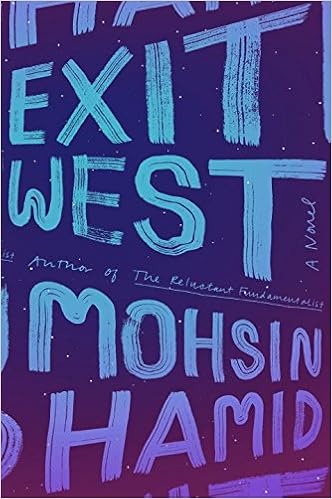War in Saeed and Nadia's city revealed itself to be an intimate experience, combatants pressed close together, front lines defined at the level of the street one took to work, the school one's sister attended, the house of one's aunt's best friend, the shop where one bought cigarettes. [loc. 568]Saeed and Nadia are citizens of a country that's never named. It might be Syria, or Bosnia, or Columbia: it might be anywhere. The country is being torn apart by civil war, and people are desperate to leave. As though summoned into being by this need for escape, doors are appearing, doors that open onto other places, other countries, though there's no way of knowing where or when: 'a normal door, they said, could become a special door, and it could happen without warning, to any door at all' [loc. 610].
The doors constitute a major global crisis, according to the media of the developed world -- the countries into which the doors open, the countries that are at peace. The doors are a passage to a better life, according to people like Saeed and Nadia, whose budding romance is stifled by the everyday inconveniences of war: a faltering phone network, irregular electricity, shelling, curfew, deaths in the family, the breakdown of the civil contract.
Nadia is something of a rebel, living alone though she is unmarried: later, outrageously, she moves into Saeed's house to help him care for his widowed father. Saeed is more solemn, increasingly braced by his faith: he prays 'as a gesture of love for what had gone and would go'. Once they have passed through the door, become refugees -- with some, if not all, of the hideous pragmatism that attends such a choice in the real world -- their relationship changes, as each of their selves is changed. For although there are no border guards or quotas or overcrowded dinghies in the world that Hamid describes, there is still racism, xenophobia, fear of the other; there are camps, and the need to work at menial jobs to earn enough money for food; the need to keep moving, and the longing for a place to call home.
This is a short and powerful novel, simultaneously stoic and lyrical: it doesn't dwell on the losses, the deaths, the partings, but it does feature arrestingly thought-provoking lines such as 'when we migrate, we murder from our lives those we leave behind'. It made me think anew (as did 2016's Queens of Syria at the Young Vic) about the realities of life in a city being destroyed by war: about the effort of maintaining normalcy as everything crumbles. And Exit West examines the idea that once you've fled your home, there is nowhere to stop.

No comments:
Post a Comment